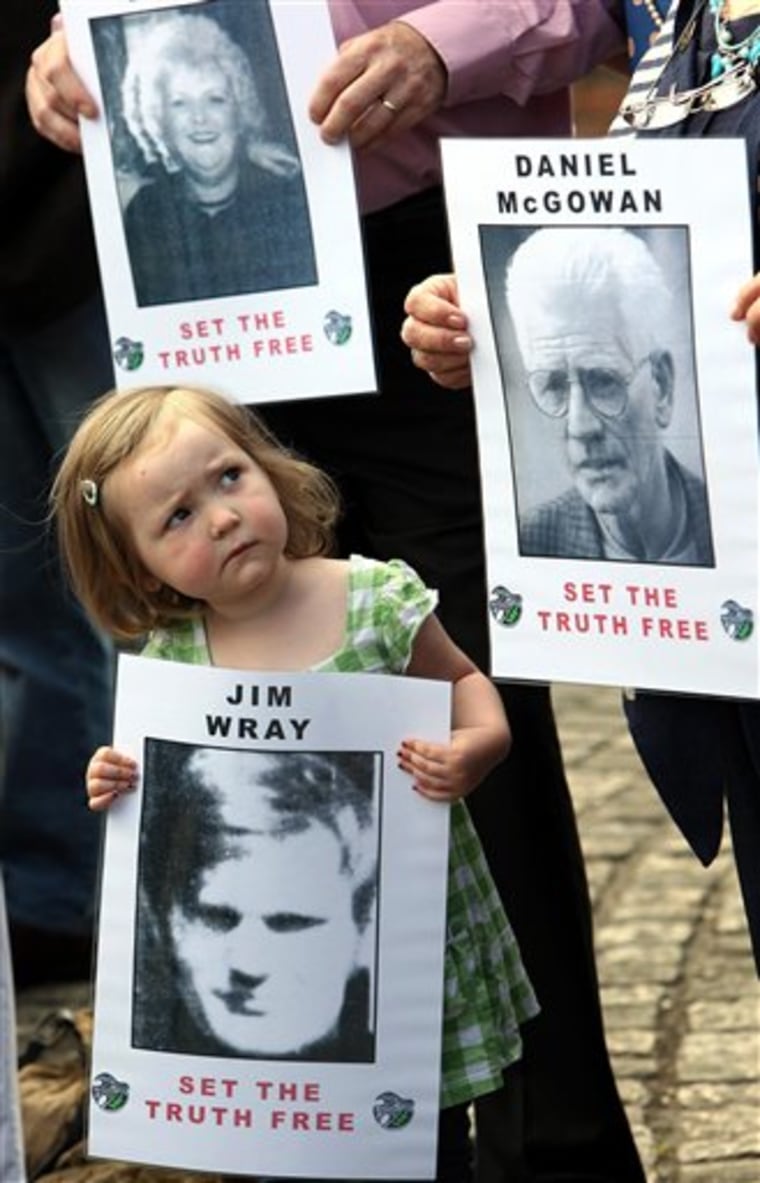British Prime Minister David Cameron apologized on behalf of his country Tuesday for the 1972 slaughter of 13 Catholic demonstrators in the Northern Ireland town of Londonderry, an outrage that became known as "Bloody Sunday."
In a solemn statement to the British House of Commons, Cameron said that a mammoth, 12-year investigation into the killings left no doubt that the soldiers confronting crowds of Catholic demonstrators in Londonderry's hard-line Bogside district mowed down unarmed protesters without provocation.
"What happened on Bloody Sunday was both unjustified and unjustifiable. It was wrong," Cameron said, as a crowd watching him from Londonderry burst into cheers and applause.
Cameron prefaced his remarks by saying he was a patriot and a strong supporter of the British Army, but said "you do not defend the British Army by defending the indefensible."
He said the 5,000-page, 190 million pound ($280 million) report contained "shocking conclusions to read" and that he was "deeply sorry" for what happened.
Costliest report in U.K. history
The report was 12 years in the making and the costliest in British legal history. Chaired by Lord Saville, a British judge, the inquiry took evidence from 2,500 people from 1998 to 2004.
On the infamous Bloody Sunday, British troops shot dead 13 protesters on the spot and wounded another 14, one of whom died weeks later. The soldiers said they shot at people who were armed with guns or nail bombs, which was strongly denied by witnesses and by relatives of the victims.
The Bloody Sunday killings galvanized nationalist sentiment in Northern Ireland and led to a surge in support for the Irish Republican Army, which fought for decades to forcibly remove the province from the United Kingdom. An earlier investigation into the killings chided soldiers for gunfire that "bordered on the reckless," but accepted soldiers' claims that they had been responding to IRA attacks.
The report published Tuesday said none of the dead had posed any serious threat to the troops, but the inquiry did not specifically accuse any of the soldiers of unlawful killing.
It found that, in almost all cases, troops were unjustified in opening fire, that they ignored their rules of engagement, failed to give appropriate warning and in some cases appeared not to care or consider the consequences. In one incident, a soldier is thought to have fired on a dead man as he lay on the ground.
"Soldiers reacted by losing their self control and firing themselves, forgetting or ignoring their instructions and training," the report said, explaining how some had mistakenly believed IRA men may be attacking their colleagues.
The inquiry said that, in previous investigations and in hearings to this panel, many of the soldiers had "knowingly put forward false accounts in order to seek to justify their firing."
'The world now knows'
Crowds gathered in front of Londonderry's neo-Gothic Guildhall building on Tuesday cheered as Cameron made his statement, and again as family members of those slain in the attack took turns making emotional speeches.
"Today the waiting has come to an end," said Mickey McKinney, a brother of one of the victims.
Tony Doherty, another victim's family member, said: "The truth has been brought home at last. The British people need to know, the Irish people need to know. The world now knows."
The report said that Bloody Sunday led to a big boost for the Provisional IRA, increased nationalist resentment, fed hostility toward the army and exacerbated the violent conflict of the years that followed.
"Bloody Sunday was a tragedy for the bereaved and the wounded, and a catastrophe for the people of Northern Ireland," the report said.
With close to 500 killings, 1972 became the bloodiest year in the Northern Ireland conflict, which pitted the IRA against the British authorities and against Unionist armed groups fighting for the province to stay under London's rule.
The inquiry was promised by former Prime Minister Tony Blair at a time when he was trying to secure Republican support for what would become the Good Friday peace deal.
